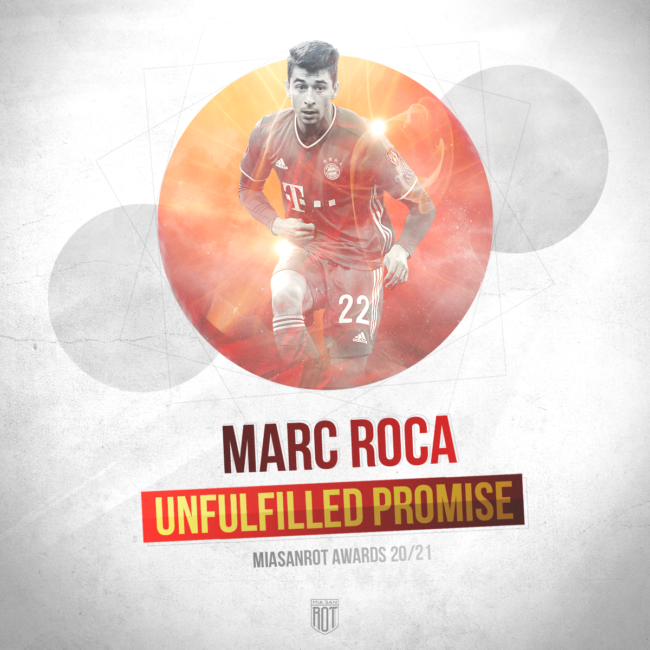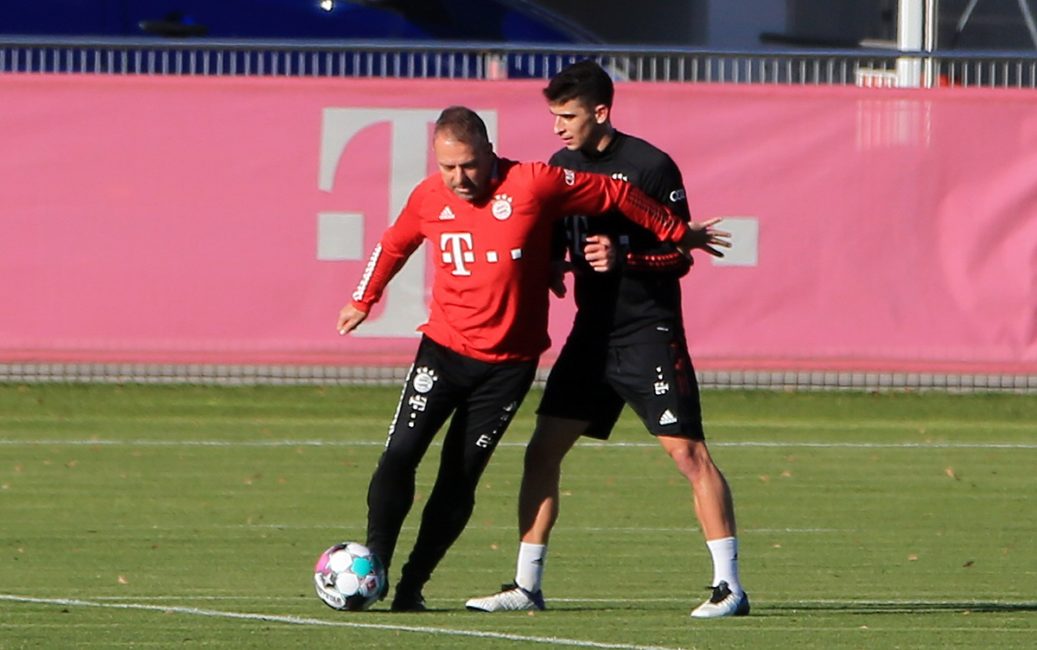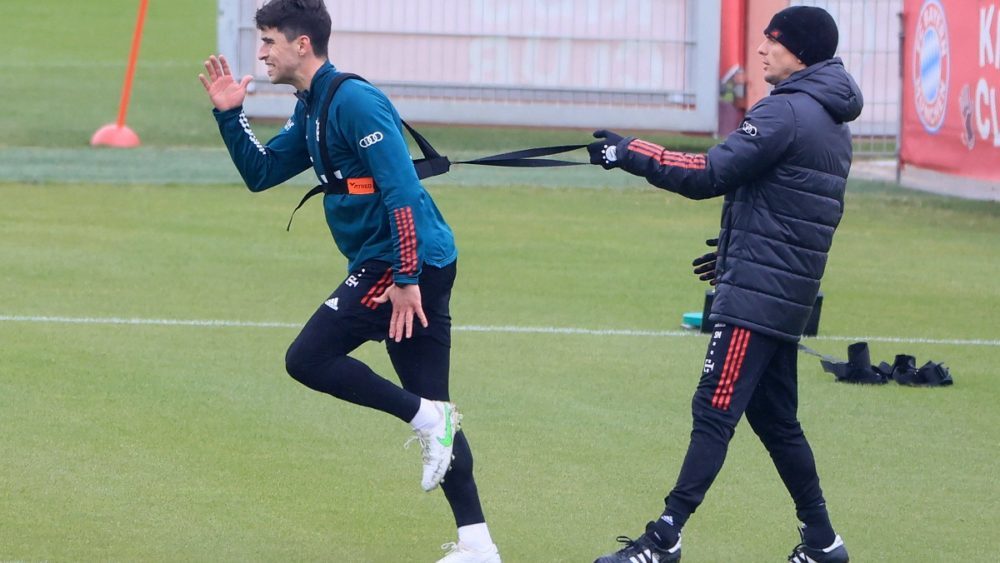MSR Awards 20/21 Season: Unfulfilled promise of the season
A transfer long in the making
The story with Marc Roca begins a year before his move to Munich, in the summer of 2019. Already after his strong showing at the U21 Euros, the young Spaniard had climbed to the top of the shopping list of then sporting director Hasan Salihamidžić. However, his then employer Espanyol Barcelona at that time was in no need to sell the central midfielder and put the utopian price tag of €40 millions on him. This ultimately proved too high a layout for the sporting management of the record champions to be willing to part with.
One year later, Roca and Espanyol were relegated to the second Spanish league. The relegation was largely a consequence of the turmoil in the club’s sporting management, which, among other things, led to three changes in the coaching position in one season, as well as an absolutely unsettled team. The then 23-year-old Roca was no more to blame for this than his team-mates, but he also could not turn things around on his own. His great supporter Joan “Rubi” Ferrer had been dismissed as coach before the season.

Plagued by money worries following their relegation, Espanyol sold their crown jewel Roca for a fraction of the previous year’s asking price. At the very last minute of a turbulent transfer period, Salihamidžić signed the midfielder for €9 million on a five-year contract. For Salihamidzic, who had meanwhile been promoted to the board at FC Bayern and was still convinced of the Spaniard, this was an absolute bargain.
The promise from Spain
A relegated La Liga side is not exactly at the top of most journalists’ and bloggers’ watch lists, so Roca’s reputation was mainly a result of his performances at the European Under-21 Championships, which he won with Spain. Parallels to the Iberians’ triumph in 2013 were drawn, when an unbridled Spain with the two youngsters Thiago and Isco dismantled opponents Italy 4:2 in the final.
Of course, the signing of Roca was not one of a ready-made player who could fill the boots of the departing Thiago like for like. But the impressions of him as related out of Spain sounded promising. He was described as having the genes of his compatriots Xabi Alonso and Sergi Busquets – or of Rodri, whom Bayern also wanted to sign in 2019 but then lost out to Manchester City in a bidding war.
His former mentor Rubi attested him above all a very good understanding of the game and the ability to read a game and take the right action at the right time. Roca has already mastered the skills of slowing down the tempo of the game as well as playing a deep pass to accelerate the game. He is a calming influence in midfield. Despite his 1.84 meters, Roca is not a particularly physical midfielder, but he does not shy away from a one-on-one battle either.
A season in the shadows
After his first season in the Bayern shirt, only 11 appearances with just 519 minutes are on the books. Roca was only given a start six times, once in the DFB-Pokal against underclass side Düren and once in the FIFA Club World Cup against the international second-rate team El Ahly. This is of course not a basis allowing of a real judgement of the Spaniard. Why did Hansi Flick put so little trust in the newcomer?
In Flick’s system, central midfielders do not have the easiest of times. The demands in this position Flick asks if his players are quite complex. Other players with similar qualities as Roca – such as returnee Adrian Fein or even World Cup winner Corentin Tolisso – also failed. In addition, the well drilled duo of Kimmich and Goretzka was always set for Flick, provided they were fit.
One thing that has top priority for Flick is the work without the ball and, above all, keeping the defense maintain a wide stance. In Flick’s system, the central midfielder finds himself alone against several attackers time and again and has to strategically cover passing routes and running paths. This requires purposeful runs at exactly the right time. These are requirements that Roca had not been faced with at Espanyol due to the different style of play there.
Accordingly, the Catalan felt visibly uncomfortable when he had to stop the opponent’s attack all by himself in the six position. Roca paid dearly for this in the Champions League match against Salzburg, when he was sent off after just under an hour having been booked a second time. He only knew to make up for his frequent positional errors with repeated fouls. This was certainly a setback in the development of a mutually trusting relationship between him and Flick.
If Flick can be faulted for anything, it is that he did not manage to properly convey the highly complicated demands he expected the central midfielders in his system to fulfill to his players and to further their development accordingly. The short pres-eason preparation, in which Roca could not even participate due to the late transfer, and the limited training time in a packed season certainly further exacerbated this situation.

(Picture: Imago Images)
With the ball, however, Roca was able to show his strengths when he did get the chance to play. Coming off the bench without rhythm is a bit difficult for most bench players – just consider Eric Maxim Choupo-Moting for example. But the midfielder did his best and was one of the best players on the pitch against Salzburg and Moscow in the Champions League. He tended to choose safety-first passes and sometimes failed to elude the opponent’s cover, but the precision and security in his passing stood out positively. As the games went on, his confidence increased visibly and he dared to play longer, sometimes very vertical, balls. That certainly wetted our appetite for more.
Facilitator Nagelsmann?
Given these impressions, we would have liked to see more of the young Spaniard, but Bayern fans will have to wait until the new season for that. Julian Nagelsmann’s arrival could bring about a new start for the now 24-year-old. The young coach is considered as someone who improves players and is able to find the best role in his system for each player based on their individual qualities.
Since Roca has not been called up to the Spanish squad for the upcoming European Championships, he can complete the entire preparation under the new coach. This could prove to be a great advantage for him. Adapting to the completely new demands in the Bundesliga requires a certain amount of time, especially for a young player, which he did not have in the crammed last season. A chance at a longer spell of intensive work with the meticulous tactician Nagelsmann will certainly help him.
Especially compared to the runner-up for the “unfulfilled promise” award, Bouna Sarr, the prospects for Roca look much rosier. Unlike the Frenchman, he knew how to use his appearances to make a case for his continued employment at the club. In his case, the five-year contract seems a sensible investment in the future and an exciting development project for Nagelsmann.
No, Marc Roca is not a legitimate Thiago successor, nor is he the next Xabi Alonso. That much is certain, but such expectations were exaggerated from the start. And yet Roca’s unique skill-set as a deep-lying playmaker had not been present in the Bayern squad until his arrival. It is precisely this gap that he now has to use to his advantage. In the coming season, he could primarily function as a back-up for Kimmich, who fills a very similar role in the Bayern midfield.
Süddeutsche Zeitung writer Javier Cáceres wrote in July 2019 already: “But maybe you have to open doors for players like Roca to find out their limit, for example at FC Bayern.” Let’s hope that Nagelsmann becomes a door opener for Roca and that the Spaniard can fulfil his promise next season, so that he will be in the running for another – and this time more positive – MSR award next year.









